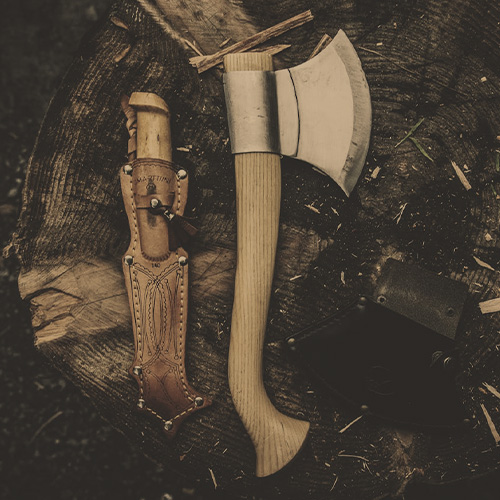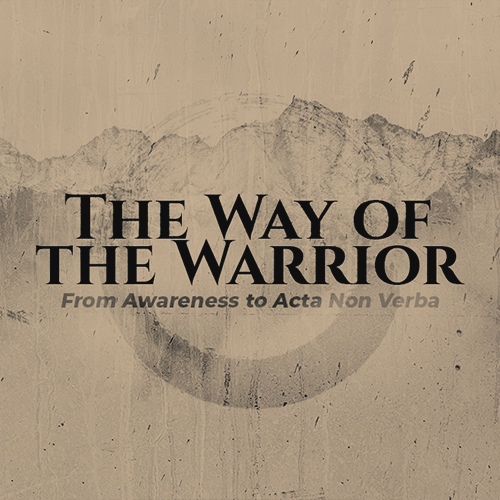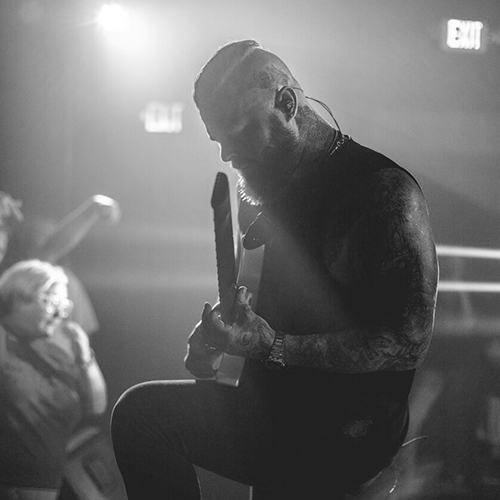In this episode Marcus explores the theme of leadership enhancement through the metaphor of sharpening a blade. Drawing insights from martial arts master Guro Alvin Catacutan, known for his work on the ‘Dune’ films, and referencing historical figures like Sun Tzu and Lao Tzu, Anderson discusses the balance between hard work and necessary pauses for skill improvement. The episode critiques the ‘grind culture’ and emphasizes the importance of using the right skill at the right time. It also highlights the concept of friction, not as an obstacle, but as a tool for creating traction and sharpening abilities.
Episode Highlights:
05:15 The Importance of Sharpening Your Tools
06:11 Balancing Work and Preparation
07:22 The Paradox of Excess
08:16 Understanding Friction
08:39 Three Types of Friction
09:50 Choosing the Right Tool
Episode Transcript:
00:02
Acta Non Verba is a show that’s raw and real, featuring hard-hitting interviews with people that live by the ethos of actions, not words. Marcus Aurelius Anderson is a TEDx speaker, best-selling author, veteran, and leadership and mindset coach.
00:17
With this show, you get to join Marcus as he goes inside the minds and experiences of the world’s most successful warriors, leaders, entrepreneurs, and experts. With each episode, you’re going to get the philosophies, concepts, tactics, and strategies these leaders use to turn adversity into victory. Live an extraordinary life based on actions, not words. Now here’s your host, Marcus Aurelius Anderson.
00:44
The blade gives up a little bit of its life every time you sharpen it. So your blade loses steel, a little bit of itself every time it sharpen. So too with people, you must let go of your old self to stay sharp. And that’s from Octo Non-Verba episode 220 with Guru Alvin Katakutan. He is incredible. I’m Marcus Aurelius Anderson, and this is another installment of Octo Non-Verba’s Warrior Wisdom. In the shorter solo episodes.
01:14
I’ll be highlighting lessons from more years past and present, and all kinds of settings from the battlefields of Italy, Greece, and Japan, to the Middle East and more modern day warfare, including tactics seen today in business, society, and culture. I’ll also be sharing leadership lessons based on my own teachings and experiences. The reality is this, the world is a battlefield, and to not master these techniques leaves you grossly ill-prepared for the adversity that you will inevitably face in the future.
01:42
In this lesson, Octodon Verba, episode 223, I’ll go over why you must learn to properly sharpen your blade as a leader. Now on to the lesson. That opening quote is from my interview from a couple of episodes back with the martial arts master, Guru Alvin Katakutan, who trained all of the actors in the blockbuster movie, Dune, one and two, and it looks like he’s gonna be on the third movie as well. I first met Guru Alvin almost 10 years ago at an instructor’s camp.
02:09
at Guru Dan and Osando’s Academy in Marina Del Rey, California. And when I got to partner up with him, his skills were incredibly impressive, and so I know him from firsthand experience. In our entire interview, we discussed martial arts philosophically in a very pragmatic way, and the subject of the blade served us as many of the analogies and examples. Now, I started studying the art of the blade seriously decades ago with the samurai sword and the tantou dagger in Aikido, and then later evolved to the single and double dagger
02:38
and then the single and double short and long sword at the Filipino martial arts of Kali under Guru Innosanto. As a matter of fact, I’m writing this podcast episode now after a two day seminar of Guru Innosanto when he was in Tulsa, so the timing couldn’t be more perfect for this lesson. So why do I use sharpening the blade as a metaphor for your leadership? Because while the blade can represent many things, the blade that I’m referring to is you, the person listening to this lesson. You are an instrument.
03:08
In fact, you’re a multifaceted being that has multiple skill sets and attributes that make you the leader and the person that you are. Those skills and attributes are also blades that must be maintained and cared for appropriately. When you study the martial arts and read martial philosophical text, you’ll see the blade is used as a common theme. The author of The Art of War Sun Tzu wrote, Even the finest sword plunged into salt water will rust. Now this is clearly a metaphor for the human spirit.
03:37
An example of how no matter how much we steel ourselves to the hardships that we face, if we are submerged completely into some sort of adversarial corrosive environment, like a fine sword plunged into a salt water, our blade will eventually rust. This reminds us to not remain in toxic environments for extended periods or even better, to avoid them entirely. The sword carried by the samurai in feudal Japan was called the katana, and it was often referred to as the soul of the samurai.
04:06
This is a reflection of the strength, honor, and discipline exhibited by the warrior class that they represented. One of those responsibilities was to painstakingly keep the blade well conditioned by keeping it clean, well oiled, and appropriately sharpened. Notice that I said appropriately sharpened, not over sharpened, and not allowed to go dull from improper use. In this life, there are all kinds of blades that you will encounter and use. A razor, for example, is a very different blade than, say, a machete.
04:36
And a philosophical razor is a blade that I use often. In philosophy, a razor is simply a principle or rule of thumb that allows one to eliminate, literally shave off unlikely explanations of a phenomenon or avoid unnecessary actions altogether. And one of the razors that I use most often is called Occam’s razor that states that the simplest answer is usually the best one. And the example that I use is, if I can solve a calculus problem in three steps instead of seven,
05:05
The simpler method is usually best if for no other reason than it uses less steps and therefore I have less chances of making a mistake in the process of the calculations. And while a razor is incredibly sharp, it is designed to do a certain job very well, but that often means that it loses its edge quickly. Yes, it can be incredibly effective when shaving, but its structure is not robust or resilient. So we wouldn’t want to use a razor to say cut down a tree. The axe.
05:33
Abraham Lincoln has attributed the quote, give me six hours to cut down a tree and I will spend the first four hours sharpening the axe. Now, Andy Versilla told an incredible story, similar to this. When I first joined the Arte syndicate six years ago, and in the example, he explains that you’ve got to swing the axe and do the work and most people understand that common work ethic. No problem. Many people understand this aspect, but he also mentions that many will continue to swing the axe even when it’s dull.
06:02
because they think that they can somehow outwork a dull blade. They are literally too lazy to quit swinging. This analogy shows the importance of knowing when to stop and sharpen the axe, and also the need to do the work in an entrepreneurial world as a leader, and not get fixated on one of these two aspects. The truth is, you will need to know when to do both to the appropriate degree and measure in order to achieve sustainable long-term success.
06:31
And yes, Lincoln was correct, spend four hours sharpening your blade, but you’d better be swinging as hard as you possibly can for those other two hours. So work hard, swing with everything you’ve got, stop and sharpen as needed. And in my interview that’s upcoming with hardcore leader, Derek Wellington Johnson, he uses a similar story about the axe and knowing when to swing or when to sharpen. And in our conversation, I also point out the phenomenon that I see in modern leadership that should be avoided.
06:59
Many feel that if a little of something is good, that a lot more of it’s even better. And this is usually the message recurgitated by the grind, grind, grind, hashtag team, no sleep, hustle, porn type of mindset seen all over social media. They overdo everything. And to them, if sharpening the blade is good, then if all they do is relentlessly sharpen their blade, that’ll be even better and they’ll be better than everyone else and they’ll be faster, make millions in half the time. And to that I say,
07:27
anything in excess eventually becomes its opposite. The legendary Taoist figure Lao Tzu wrote in the second most published book in history, the Tao Te Ching, quote, continue to sharpen your blade and it will go blunt. Again, it comes down to using the appropriate skill to the appropriate degree at the appropriate time. This could not be more important than when we’re dealing with friction. Ironically, we must cut our own blade to maintain our edge.
07:56
And while many may not realize it, sharpening our blade is accomplished by small micro abrasions that slough off the dullness of our steel by hacking away the inessentials, to quote Bruce Lee. Iron sharpens iron, and we are only able to do this via friction. We use friction to cut the blade. Now when we hear the word friction, there’s normally a negative connotation attached to it. People saying things like, we’re experiencing friction in this project, or I could feel friction the moment that I entered the room.
08:25
But like all things, there are multiple perspectives and orientations by which to see the same subject of friction, and if we do it appropriately, if we can find the gift in adversity, we can find some of these to be to our advantage. I see friction of having three different kinds. The first friction is the one that most people think of, and this is the kind of friction that will just rub you raw. So if you continue going down the exact same path that you’re doing right now, yes, you probably will get rubbed raw. That is not the ideal.
08:56
Having said that, we also have to look at this idea of if I’m able to change my perspective or change my orientation or the angle that I’m approaching this friction, it can change how the friction responds to me, meaning this. If I am able to step above the friction now and put my foot on top of that friction, now that friction goes from being friction into traction. And now I can push off of that and go to a higher level. So that’s a second form of friction.
09:26
The third form of friction is what we’re referring to when it comes to our blade. We use the same friction, we change the angle slightly, and now that’s able to slough off just enough of the steel that’s no longer serving us, but also keeps us getting to the point of over-sharpening and making our blade go dull. Again, it’s the same friction, it’s the way that we respond to it that changes the outcome. Finally, the appropriate tool for the job, the utility blade versus the defensive blade.
09:56
In certain styles of Kali, it is said that if you have less than a dozen blades on you, you’re naked. Now, this beautifully illustrates the need for multiple skill sets and that each blade that skill set represents needs to be treated appropriately. For example, when I receive an order in the mail and need to cut open that box, the last blade that I would use to do that task would be the one that I keep for close quarter protection. If I’m deling that blade by repeatedly cutting open boxes, that would remove the edge that may be necessary to protect myself.
10:24
or someone else with that blade. For everyday use, like cutting boxes, I have a utility blade just for that purpose. And let me ask you this. Imagine you have a Lamborghini. If you owned a Lamborghini, you wouldn’t treat it like a lawnmower. You would keep it well maintained so it could perform at the level that it’s famous for. And yes, I’m very aware that I can simply resharpen my personal defense blade, but bear in mind the opening quote. Every time I sharpen the blade,
10:53
it sacrifices a part of itself for me to do so. In other words, by using the blade in an inappropriate manner or for a job better suited for a utility blade, I’m aging that blade prematurely and shortening its lifespan for me. Your after action items to be applied for the next 30 days. Number one, ask yourself, have you selected the appropriate blade for the job ahead of you? As a leader and a CEO, this can refer to the person that you sent to do a job.
11:22
Do they have the correct skill set, experience, and attitude for the task? Does it require something surgical like a razor sharp scalpel? Or does the job require it to be something that has more weight to it, like an axe to complete the task? In the conversations you’re about to have, which one would better serve your purpose? Being unnecessarily direct or wasting valuable time with an indirect approach won’t help you accomplish the objective. More than likely, you’ll need to have multiple layers and multiple types of blades
11:52
for large to small and everything in between for the multiple aspects of your objective. Number two, also understand that the technique used to wield the axe may not be appropriate for a razor and vice versa. Yes, you gotta swing the machete hard, but don’t expect that to do well with the surgical precision of a scalpel if that’s what the job calls for. Also, don’t break your smaller blades trying to cut down a redwood. Number three.
12:21
Where are you not being disciplined and paying attention? And what I mean is, where do you need to take the time to stop swinging the axe to sharpen it when it’s obvious that your swings are with a dull blade that are ineffective and a waste of time and energy? Conversely, where are you wasting time by quote unquote sharpening your blade when it’s already more than sharp enough to do the job that you need to? When you catch yourself doing this, admit that you are no longer sharpening your blade.
12:49
You are simply procrastinating. Then get off your ass and get back to work. Again, back to the opening quote. You are literally losing a piece of yourself every time you sharpen the blade, which means if you are sharpening your blade as a way to stall and procrastinate, you are literally committing suicide slowly. You’re just not aware of it yet. Finally, keep in mind that all these concepts are double-edged swords in and of themselves. Be aware of both sides of the blade to prevent any sort of deep
13:19
self-inflicted wound that may be unintentional that you create. Thus endeth the lesson. If you’ve enjoyed this or any of the other 220-plus episodes of Octa Nonverba, I highly recommend going back through the entire Octa Nonverba catalog that includes more warrior wisdom episodes, like one from the Miyamoto Masashi book of Five Rings, Bruce Lee’s Marshall philosophy for leaders, and one that I do about my Jeet Kune Do instructor and Bruce Lee protege, Guru Dena Nsanto.
13:47
as well as longer deep dive interviews with some of the most successful warriors, leaders, athletes, and experts in the world. None of these episodes are behind a paywall or a Patreon. They are all available free for the moment. So go check out the entire catalog while you can. While you’re there, hit subscribe and tell us what you think about this episode in review on iTunes, Spotify, or wherever you listen to Acta Non Verba. This helps us attract more listeners and spread the Acta Non Verba message to others.





